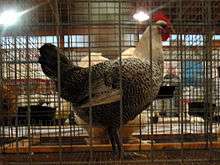Faiyumi
_(cropped).jpg) A Faiyumi pullet | |
| Other names |
|
|---|---|
| Country of origin | Egypt |
| Traits | |
| Weight | |
| Skin color | slate blue |
| Egg color | tinted |
| Comb type | single |
| Classification | |
| PCGB | rare soft feather: light[2] |
| |
The Faiyumi is a breed of chicken originating in Egypt. Faiyumis are a very old breed in their native region, and are named for the Faiyum Governorate southwest of Cairo and west of the Nile.
History
Representations and descriptions of domestic fowl first appear during Egypt's New Kingdom. King Tutankhamen had pet Sri Lanka junglefowl procured through the ancient cinnamon trade. Fayoumi chickens are believed to be descendants of junglefowl hybrids with domestic fowl that have adapted for life in thorn palm forests and marshes in Egypt ~ 3,000 years ago. They have been present in the West since at least the 1940s, when they were imported from Egypt by an Iowa State University Dean of Agriculture.[1] [3] However, they are not officially recognized for exhibition by the American Poultry Association, and are not included in the Standard of Perfection.[1]
Characteristics

With their upright tails and forward jutting breast and neck, they are sometimes likened to a roadrunner.[1] They are a lightweight fowl, with roosters weighing in around 2 kilograms (4.4 lb) and hens 1.6 kg (3.5 lb). They appear only in a single variety. In roosters, the plumage is silver-white on the head, neck, back and saddle, with the rest in a black and white barring. Hens have heads and necks in the silver-white hue, with the rest barred. Faiyumis have a single comb, earlobes, and wattles are red and moderately large, with a white spot in the earlobes. They have dark horn colored beaks, and slate blue skin. Their appearance is remarkably similar to the silver variety of the Campine breed of Belgium, and the Campine may be descended from a Faiyumi-like chicken brought north in Europe by the Romans.[4]
Faiyumis are a hardy breed, and particularly well suited to hot climates.[5] The breed, through poultry genetics research and anecdotal reports, is thought to be especially resistant to viral and bacterial infections.[1] They are also very good foragers, and if left to their own devices on a free range basis they can fend for themselves in a nearly feral manner. Faiyumi hens are good layers of small, off-white eggs. They are not given to broodiness as pullets, but can be when they reach two or three years of age. The breed is fast to mature, with hens laying by four and half months, and cockerels crowing at five or six weeks.[1]
Footnotes
- 1 2 3 4 5 6 7 (Ekarius 2007, p. 54)
- ↑ Breed Classification. Poultry Club of Great Britain. Accessed August 2014.
- ↑ "Egyptian chicken plan hatches . . . 50 years later". Iowa State University. May 1997. Retrieved 2008-06-12.
- ↑ (Ekarius 2007, p. 48)
- ↑ (Heinrichs 2007, p. 67)
References
- Ekarius, Carol (2007). Storey's Illustrated Guide to Poultry Breeds. 210 MAS MoCA Way, North Adams MA 01247: Storey Publishing. ISBN 978-1-58017-667-5.
- Heinrichs, Christine (2007). How To Raise Chickens. Voyageur Press. ISBN 978-0-7938-0601-0.